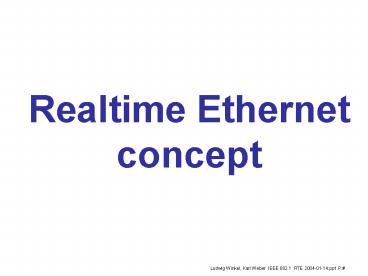RTE PowerPoint PPT Presentation
Title: RTE
1
Realtime Ethernet concept
2
Ethernet as multi-purpose bus
- Ethernet communication in automation
- Coexistent use of realtime and IT
communicationon one line - Uniform realtime protocol for all requirements
- Scalable realtime communication from
high-performance to isochronous
3
OPC-DX
IEC 61158 IEC 61784 Ethernet based C. (IEC
SC65C Digital Communication)
ControlNet/IP
PROFInet
FF-HSE
1784-1 based
RealTime Class 1 ?????
CIP
Run time RT-Auto ACCO
FB AP NMA MIB SMK
User
FMS SMKP MIB FDA SNTPSNMP
Application (7)
DCOM
Transport (4)
Encapsulation
TCP
UDP
TCP
UDP
TCP
UDP
Network (3)
IP
IP
IP
Data Link Layer (2)
Modem, ISDN, wireless. ...
RealTime Ethernet Class 2
PhLayer (1)
IEEE 802.1, IEEE 802.3, IEEE 1588, IEEE 802.x....
Technology specific
ISO/OSI Referenz Model
Identical for all CPF
4
Realtime Ethernet
- Realtime deterministic data transmission
- Ethernet industrial communication based on IEEE
802 and switching technology - Realtime Ethernet (RTE) classes
- No RTE no provisions for deterministic
communication - Low end Class 1 Cycle times in the range from
5 to 10 msec. Fully compatible with the IP
standard and no restrictions on networking
components. - High end Class 2 Cycle times in the range from
0,25 to 5 msec. Fully compatible with the IP
standard with networking components supporting
RTE Option.
5
RTE Class 2 for motion control
- RTE Class 2 covers the requirements for the
motion control applications market segment. - RTE Class 2 shall be also fully compatible with
the IP standard - with no restrictions.
6
Requirements for motion control applications
Real-time capability
7
Switching technology - the basis for RTE
- RTE utilizes switching technology
- Standard in the office world
- Prospects for higher data rates
- A large number of stations
- Wide network expansion (cascades of 20 or more)
- Electrical 100 m per segment
- FO 3 km per segment
- Full-duplex capability
- Data streams remain local and do not place load
on the entire network - Simple configuring rules
8
Communication architecture with Switch
- The RTE class 1 and 2 communication
- - an integrated and scalable solution -
9
Separate track to guarantee realtime
RTE Cl.2
In case of a traffic jam, even the class 1
traffic stuck
RTE-Protocol get priority compared to
TCP/IP-protocol.
RTE Cl.1
Non RTE
10
Concept for RTE Class 2
- Communication system scheduling
- - separate time domains for real-time and
non-real-time -
Open channel (IP)
Open channel (IP)
RTE channel
RTE channel
Cycle 1
Cycle 2
Cycle n
E.g. 1 ms position control cycle
Synchro-nization
Deterministic communication
Open communication
RTE data
IP data
11
Performance parameters for RTE Class 2
) Standard length of the IP data packets from
64 to 1536 bytes Max. data transmission rate on
Fast Ethernet 12 MB/sec
12
Distribution of updating times
Occurence n
Non RTE
RTE Cl.1
RTE Cl.2
t
10 msec
0.25...1.0 msec
100 msec
13
Consequences to IEEE 802
- Enhancements to the IEEE 802.1D2003 standard for
RTE switched networks - Amend RTE Option
- In IEEE 802.1D or
- Specify it separately in IEEE P802.1 or
- Specify it separately in IEC SC65C.
- Detailed Concepts will be described in IEC SC65C
(IEC 61784-2) - Technical topics of the RTE option see next pages
14
Technical issues on real time switching
- Synchronized behaviour based on IEEE 1588-Sync
- Common cycle time
- Coordinated start of real time schedule
- Scheduled forwarding
- Shut down of non real time(RT) processing prior
to RT phase - Disable non RT forwarding while a port is in RT
phase - Scheduling list may be used to guarantee precise
delivery - Coordination of application and communication
- Ability to run control loops
- Eliminate jitter of communication cycle by
timestamping - Fast recovery from communication problems
- Use redundant paths
- Include a means for duplication detection

